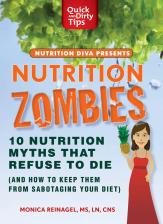Fish and Prostate Cancer Risk
Recent studies suggest that high intake of omega-3 fats increases your risk of prostate cancer. Should you stop taking fish oil? Nutrition Diva takes a closer look at the pros and cons of fish and fish oil for men.
Monica Reinagel, MS, LD/N, CNS
Listen
Fish and Prostate Cancer Risk

See also: Diet Tips for a Healthy Prostate
>
What Do Fish and Fish Oil Do For Your Health?
Before we delve into the details of the recent study, let’s quickly review what fish and fish oil are supposed to do for you. Many (but not all) studies have found that people who regularly eat fish have a lower risk of heart disease. The general consensus is that the cardio-protective benefits of fish and fish oil are due to the omega-3 fats they contain. Omega-3s may also confer some protection against certain kinds of brain aging, cancers, eye, and kidney disease. The American Heart Association as well as other public health authorities recommend eating fish (especially fatty fish, like salmon or sardines) at least twice a week. And for a long time, many assumed that a daily fish oil capsule would accomplish the same benefits.
See also my recent interview on WYPR-FM on the Pros and Cons of Vitamin Supplements
Unfortunately, this may have been a false assumption. While eating fish seems to be a good idea, research on fish oil supplements has been disappointing. I think this is yet another case where the whole is more than the sum of the parts. Simply taking a fish oil capsule does not provide the same benefits as eating a healthy diet that contains fish. After all, some of the benefits ascribed to eating fish may have to do with what you’re not eating because you’re eating the fish instead.
(continued from previous page)
What’s the Link Between Omega-3s and Prostate Cancer?
In any case, most of the men in this latest study weren’t taking fish oil supplements. The higher omega-3 levels observed here appear to be mostly the result of higher fish consumption. Which brings us to the million dollar question: Does eating fish increase your risk of prostate cancer? And if so, how do you weigh the benefits to your heart and brain against the potential risk to your prostate?
First, let me point out this finding is a correlation, meaning that these two characteristics (high blood levels of omega-3s and prostate cancer) tend to occur together. This study does not prove that omega-3s cause prostate cancer. In fact, other researchers have found a correlation between higher omega-3 blood levels and reduced risk of prostate cancer. Still other studies suggest that the relationship or ratio of omega-3s to other types of fat may be a factor.
See also: Does the Omega Ratio Matter?
I realize this is not very helpful for guys who are simply trying to figure out whether they should or should not order the salmon tonight. Unfortunately, that’s how science works. Scientists get used to dealing with this sort of uncertainty. When it’s your prostate on the line, it’s not so easy to be blase about it. But it might help settle your nerves to put the risks in perspective.
Putting the Risks in Perspective
The study found that men with the highest intake of fish oil had a 71% increase in aggressive prostate cancer. That’s a big number connected to a scary diagnosis. But as I explained in a recent episode, expressing things in terms of relative risk often makes things seem a lot scarier than they actually are. Let me restate the same findings in slightly different terms: If you’re over 50 and you rarely or never eat fish, your risk of developing aggressive prostate cancer is a little over 1%. If you eat two or more servings of fish a week, your risk is a little under 2%. Meanwhile, your risk of developing heart disease is approximately 50%.
My Advice On Fish, Fish Oil, and Life in General
So, what, if anything, should you do in response to this new research? Ideally, decisions about diet and supplementation should be made in consultation with your doctor and/or a qualified nutrition professional who knows the details of your specific medical history. For example, if you have a history of or risk factors for either heart disease or prostate cancer, that would certainly influence how you’d weigh the cardioprotective benefits of fish against potential prostate risk.

- As much as possible, get your nutrition from food instead of pills. A healthy diet beats a handful of supplements every time.
- More is not always better. Even healthy foods and valuable nutrients can be harmful when consumed in excess quantities. Aim for balance, variety, and moderation.
- Live the healthiest life you can enjoy living. Although the choices we make certainly have an impact, there’s no one diet or lifestyle that guarantees that you’ll never face health challenges. A lot of it is due to factors beyond our control. So, do the best you can but make sure to enjoy the ride!
See also: Moderation in All Things
References
Brasky TM, Darke AK, Song X, et al. Phospholipid Fatty Acids and Prostate Cancer Risk in the SELECT Trial. J Natl Cancer Inst. 2013 Jul 10. View abstract.
Kris-Etherton PM, Harris WS, Appel LJ; American Heart Association. Nutrition Committee. Fish consumption, fish oil, omega-3 fatty acids, and cardiovascular disease. Circulation. 2002 Nov 19;106(21):2747-57. View article.
Norrish AE, Skeaff CM, Arribas GL, Sharpe SJ, Jackson RT. Prostate cancer risk and consumption of fish oils: a dietary biomarker-based case-control study. Br J Cancer. 1999 Dec;81(7):1238-42. View article.
Williams CD, Whitley BM, et al. A high ratio of dietary n-6/n-3 polyunsaturated fatty acids is associated with increased risk of prostate cancer. Nutr Res. 2011 Jan;31(1):1-8. View abstract.
Fish dinner image courtesy of Shutterstock.

